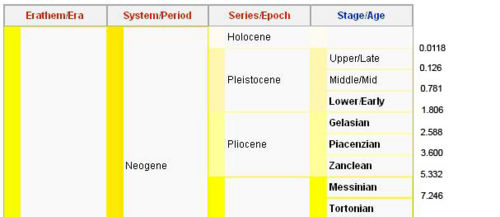Talk:Geologic ages of earth history: Difference between revisions
imported>Nereo Preto (→Absolute ages in schemes: note) |
imported>Chris Day No edit summary |
||
| (2 intermediate revisions by 2 users not shown) | |||
| Line 1: | Line 1: | ||
{{ | {{subpages}} | ||
== Absolute ages in schemes == | == Absolute ages in schemes == | ||
| Line 129: | Line 115: | ||
* Table: is someone able to put the ages on? (see ''Absolute ages in schemes'', above) --[[User:Nereo Preto|Nereo Preto]] 10:37, 9 June 2007 (CDT) | * Table: is someone able to put the ages on? (see ''Absolute ages in schemes'', above) --[[User:Nereo Preto|Nereo Preto]] 10:37, 9 June 2007 (CDT) | ||
== Need to match article name with topic sentence == | |||
It seems to my uninformed mind that the first sentence "The geologic history of the earth..." is a better title than the current and cumbersome "Geologic ages of earth history". I leave it to the experts to decide what the focus of the article actually is/should be, but in any case the title and content should match and the title should be readily understood and snappy. [[User:Aleta Curry|Aleta Curry]] 18:54, 20 June 2008 (CDT) | |||
Latest revision as of 12:05, 1 July 2008
Absolute ages in schemes
Is anyone able to do something like this with schemes of time/rock subdivisions? It would be great. The alternative is to add a column to the tables with the absolute age of beginning for each subdivision, in Ma (million years ago). This latter solution would be, however, much less fancy. --Nereo Preto 13:19, 3 June 2007 (CDT)
P.S.: an example of one more column is in the thread above, green-colored. I don't like it much. --Nereo Preto 13:23, 3 June 2007 (CDT)
- Note: the green example is now stored in /Archive 1 --Nereo Preto 02:25, 21 August 2007 (CDT)
How does this look. (The code is far form beautiful, it's not an easy thing to do this.) Derek Harkness 20:49, 9 June 2007 (CDT)
| Erathem/Era | System/Period | Series/Epoch | Stage/Age | (Ma) |
|---|---|---|---|---|
| Cenozoic | Neogene | Holocene | 0.0118 |
|
| Pleistocene | Upper/Late | 0.126 |
||
| Middle/Mid | 0.781 |
|||
| Lower/Early | 1.806 |
|||
| Pliocene | Gelasian | 2.588 |
||
| Piacenzian | 3.600 |
|||
| Zanclean | 5.332 |
|||
| Miocene | Messinian | 7.246 |
||
| Tortonian | 1234 |
|||
| Serravallian | 1234 |
|||
| Langhian | 1234 |
|||
| Burdigalian | 1234 |
|||
| Aquitanian | 1234 |
|||
It is a good start. Now if we could just get rid of borders and background in the last column... is there a help page or a handbook for wikitables? --Nereo Preto 03:21, 10 June 2007 (CDT)
List of perfectable things...
I am (slightly) passing this article throughout, to clean it up and make it look great. I open here a list of things that could be better. Add to list if you find problems, or strike the point if you find a solution!
Introduction
- Geological ages in common use. Could we have one or more references for the common use? --Nereo Preto 10:35, 9 June 2007 (CDT)
- Common use is just that. The point is a matter of clarification. Folks think of "The Jurassic Age" since they saw Jurassic Park. Deep Impact, another example of popular conception, there are these drastic catastrophes (redundant to make a point) and then everything changes. Common use and thus common perception. --Thomas Simmons 19:58, 9 June 2007 (CDT)
- Yes, got the point. Now, I believe what we are REALLY talking about are era/erathem boundaries here. At lower hierarchical levels, the relationship boundary-catastrophe becomes less and less true. I'll try to clarify this point better within the introduction. We'll need a mass extinction article sooner or later... This should be a solution also from the problem below. --Nereo Preto 03:29, 10 June 2007 (CDT)
- refers to marked changes... at odds with boundaries are placed at completely arbitrary positions --Nereo Preto 10:35, 9 June 2007 (CDT)
- It should be at odds. There were dinosaurs and then there weren't. Clear definitions in the common percpetion. The details get lost in the common perceptions. So, the first one is the common perception and the later is the scientific perception.--Thomas Simmons 19:58, 9 June 2007 (CDT)
- I believe we can get rid of this contradiction without losing touch with common perception, see above. --Nereo Preto 03:29, 10 June 2007 (CDT)
History
Definitions
...
Schemata/eons/Phanerozoic
- Table: is someone able to put the ages on? (see Absolute ages in schemes, above) --Nereo Preto 10:37, 9 June 2007 (CDT)
Need to match article name with topic sentence
It seems to my uninformed mind that the first sentence "The geologic history of the earth..." is a better title than the current and cumbersome "Geologic ages of earth history". I leave it to the experts to decide what the focus of the article actually is/should be, but in any case the title and content should match and the title should be readily understood and snappy. Aleta Curry 18:54, 20 June 2008 (CDT)
